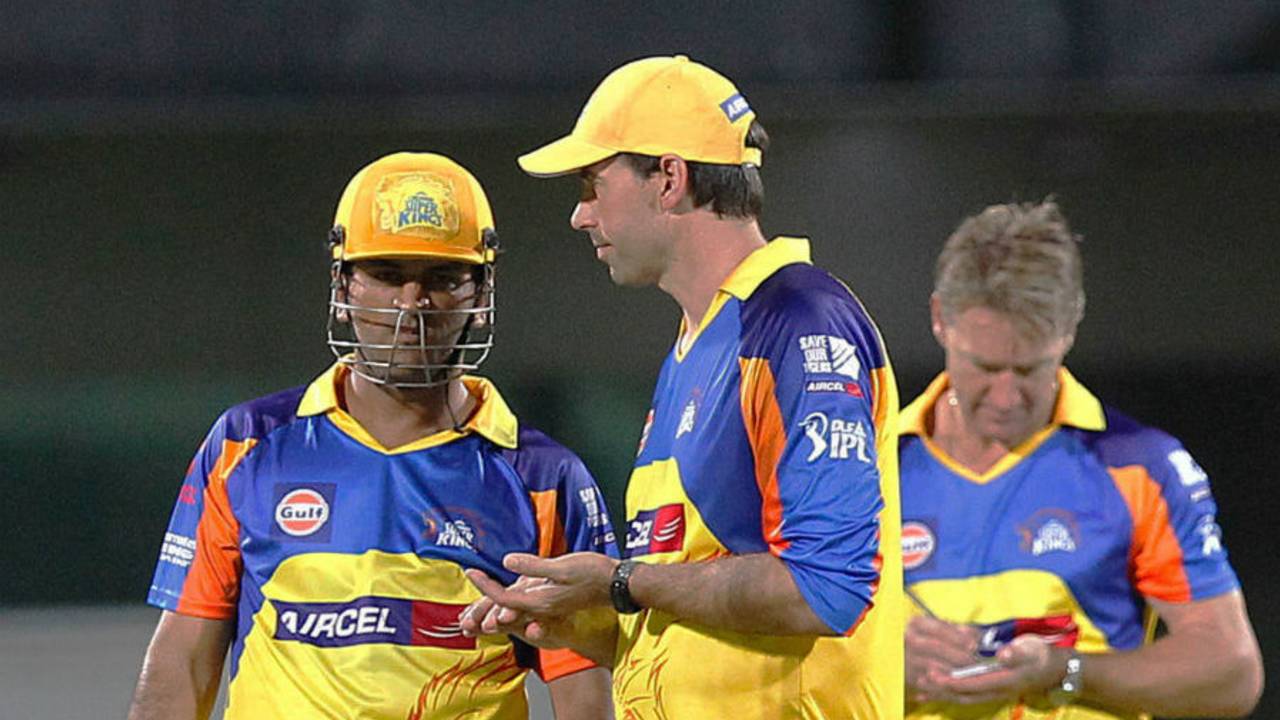Loyalty and security help Super Kings thrive
Chennai Super Kings have made the knockout stages of every IPL season, and have won the tournament twice. Ahead of their sixth final, ESPNcricinfo looks at why Super Kings are a formidable knockout opponent
Arun Venugopal
24-May-2015
In Stephen Fleming and MS Dhoni, stability starts at the top for Chennai Super Kings • Hindustan Times via Getty Images
Loyalty in selection
It is hard to get into the Chennai Super Kings side, but if you are in it it's harder to get out, is how the joke goes. Just ask R Ashwin. It wasn't until his third season with the team that he got a decent run after playing only two matches in the first two years.
It is hard to get into the Chennai Super Kings side, but if you are in it it's harder to get out, is how the joke goes. Just ask R Ashwin. It wasn't until his third season with the team that he got a decent run after playing only two matches in the first two years.
Even during the player auctions, Super Kings try hard to keep their core intact. They are the only side to have had the same captain since the IPL began. Suresh Raina has been a Super King from the start and has played all their games, while Stephen Fleming - first as player and now as head coach - has also been associated with the team from its inception.
Fleming and the team management have spoken about giving players a fair run before judging them. Such a philosophy has made them loath to making changes even when somebody isn't doing well. Super Kings have been criticised for not using their bench strength enough but they have reaped the benefits of their methods.
The consistency in selection has fostered a cohesiveness that has given Super Kings intangible advantages - M Vijay calls it being in a comfort zone - especially amid the pressure of a knockout game. Importantly, they have achieved the balance between sticking with a player and benching him when required.
In 2012 for instance, Vijay had a patchy run, and after dropping him for a few games, Super Kings brought him back for the knockouts. He scored a match-winning century against Delhi Daredevils in the second qualifying match.
Unemotional decision-making
In Fleming and Dhoni, there is the perfect coming together of method and instinct, and both of them are secure in their respective spaces. It helps that communication within the team is simple and direct: Dhoni is apparently not one for lengthy pre-game meetings.
In Fleming and Dhoni, there is the perfect coming together of method and instinct, and both of them are secure in their respective spaces. It helps that communication within the team is simple and direct: Dhoni is apparently not one for lengthy pre-game meetings.
Be it Dhoni's post-match address or Fleming's press conferences, they are heavy on detail with little hyperbole. Fleming has always spoken about taking emotions out of decisions, and with people like him and Dhoni in the leadership group such a mindset percolates into the rest of the team.
Familiarity with roles
Dhoni has some quirks when it comes to his field-placements, but otherwise Super Kings don't surprise much in terms of tactics. If you watch a few games, you will know who bowls in the Powerplay, who is used exclusively in the middle, and who bats in which position.
Dhoni has some quirks when it comes to his field-placements, but otherwise Super Kings don't surprise much in terms of tactics. If you watch a few games, you will know who bowls in the Powerplay, who is used exclusively in the middle, and who bats in which position.
Fleming acknowledges his team has a conservative approach and that they are often called boring. There is a danger to being too predictable but Super Kings have always been averse to freakish changes, and their solid style has brought results.
No fear of failure
Super Kings have largely been successful in removing the fear of failure from the group. Their assessment of players has been based on what they did or did not do, rather than the outcome of those actions.
Super Kings have largely been successful in removing the fear of failure from the group. Their assessment of players has been based on what they did or did not do, rather than the outcome of those actions.
Sample Fleming's comments on his misfiring batsmen ahead of the second Qualifier against Royal Challengers Bangalore: "If they play shots that aren't in their repertoire then we have got an issue, and if they get out trying do something that they have done well over the season and then I am fine with that."
The absence of over-reliance
Speak of Super Kings' match-winners and a few names immediately pop up: Raina, Dhoni, Ashwin, Dwayne Bravo and Brendon McCullum. But none of their key players seem overburdened in a must-win game because the others have often shared the pressure in critical games.
Speak of Super Kings' match-winners and a few names immediately pop up: Raina, Dhoni, Ashwin, Dwayne Bravo and Brendon McCullum. But none of their key players seem overburdened in a must-win game because the others have often shared the pressure in critical games.
In the semifinal in 2010, it was Doug Bollinger who claimed four wickets to pin down Deccan Chargers, and players like Mohit Sharma - even when he was new - have taken responsibility in knockout matches in the past.
Arun Venugopal is a senior sub-editor at ESPNcricinfo
